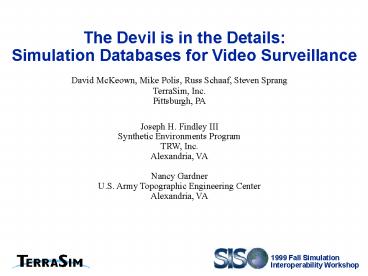The Devil is in the Details: - PowerPoint PPT Presentation
1 / 34
Title:
The Devil is in the Details:
Description:
Two test sites: Schenley Park (CMU Campus) Fort Benning (MOUT Site) ... Provide a synoptic view of complete set of activities. Modeling of Video Sensors to provide: ... – PowerPoint PPT presentation
Number of Views:91
Avg rating:3.0/5.0
Title: The Devil is in the Details:
1
The Devil is in the Details Simulation Databases
for Video Surveillance
David McKeown, Mike Polis, Russ Schaaf, Steven
Sprang TerraSim, Inc. Pittsburgh, PA Joseph H.
Findley III Synthetic Environments Program TRW,
Inc. Alexandria, VA Nancy Gardner U.S. Army
Topographic Engineering Center Alexandria, VA
2
Video Surveillance and Monitoring(VSAM)
- Defense Advanced Research Projects Agency (DARPA)
sponsored project within Image Understanding
Program - Develop a cooperative, multisensor, video
surveillance system to provide continuous
coverage over urban and battlefield environments - Integrate isolated video stream for understanding
- humans (individual, groups), vehicles
- With real world geospatial activity models
- activity prediction, activity hand-off
3
VSAM Database Requirements
- Two test sites Schenley Park (CMU Campus)
- Fort Benning (MOUT
Site) - Requirements for high geospatial accuracy (sub
meter) - Must correlate with the live exercise for virtual
playback - Provide a synoptic view of complete set of
activities - Modeling of Video Sensors to provide
- 3D position
- sensor instantaneous field of view
- sensor pan/tilt field of view
- predictable line of sight
- Conversion to MODSAF CTDB
4
VSAM Virtual World Goals
- Provide highly accurate virtual sight models to
support video understanding researchers - Support the development of virtual camera models
within MODSAF - Virtual camera allows for video algorithm
development, testing, planning for video sensor
deployment - Replay of video streams vs. virtual world
movements.
5
VSAM Database Construction
- Construction using non-traditional geospatial
data sources - Incorporate a high degree of automation
- Avoid manual modeling using TerraTools
- Integrated TIN (ITIN) representation
- Integrated features (roads, sidewalks, drainage,
bridges) - Heterogeneous data sources
- GIS data, ground survey, NIMA source, aerial
imagery - Building model sources
- As-built building models (Openflight, AutoCad)
- Generate representative buildings from GIS
footprints - Photogrammetrically derived from aerial imagery
6
The Schenley Park Database
7
ARC/INFO GIS Source Data
Detail of GIS Data with 5-foot contours
GIS Source Data
8
Schenley Park Statistics
- 415 Acre park with internal trails, paths, and
roads - Dense transportation network, bridges and unique
building architectures - 3x3 km total area
- 115.8 km of roads
- 5995 unique building structures (4265 residential)
9
Schenley Park Buildings
- Building Area/ Footprint
- Derived from GIS source data
- Building Heights
- Proportionally derived from building area
- Building Roofs
- Peaked or flat roofs were assigned based on
other building attributes such as size and shape - Residential buildings were assigned peaked
roofs commercial buildings were assigned flat
10
CMU Campus
11
GPS Survey Points and Camera Locations
12
Video Tracking
Live view for video tracking
Video View tracking
13
Accuracy of Schenley Park Database
- Assessed by measuring building sides and corner
to corner distances - On 15 building segments
- RMS Error 1.4 m
- Average error relative to length 5
- Of 8 intrabuilding distances (corner to corner)
- RMS Error 1.8 m
- Relative error 4.5
14
Accuracy of Schenley Park Database
- Assessment of vertical accuracy of video camera
points - Point A Camera Position at eastern peak of PRB
Building
15
Accuracy of Schenley Park Database
- Assessment of vertical accuracy of video camera
points - Point C Wean Hall camera position along north
face of building
16
The Fort Benning Database
17
Source Data Ft. Benning
15000 Scale Imagery
18
Source Data Ft. Benning
Contours and Trees
Digitized Areal Features
19
Source Data Ft. Benning
OpenFlight Building Models
Road Network (DXF format)
20
The Ft. Benning DatabaseStatistics
- 17 previously constructed building models
- 17.7 miles of type-specific roads
- 260 Geospecific tree models
- 45 additional models derived from an orthophoto
- fire hydrants
- manholes
- railroad ties
- telephone poles
21
The Ft. Benning DatabaseTree-Model Placement
- Eastern side of MOUT
- GPS tree positions compiled by land survey team
- TerraTools automatically placed models into
terrain - Western side of MOUT
- Tree positions determined by orthophotos
- Models hand edited into terrain using TerraTools
tedit
22
McKenna MOUTMilitary Operations on Urban Terrain
23
Ft. Benning Tree Models
24
Ft. Benning Tree Models
25
Imagery vs. Simulation
26
Imagery vs. Simulation
27
Imagery vs. Simulation
28
Imagery vs. Simulation
Limitations of Simulation Database Construction
29
Accuracy of Ft. Benning Database
- Models were placed using intrabuilding distances
(corner to corner) - Residual Error Analysis
30
VSAM Database Complexity
31
Area Normalized Polygon Count Comparison of
Databases
32
Area-Normalized Polygon Count Comparison of
Databases
33
Polygon Count Comparison of Databases
34
Conclusions
- DARPA VSAM Program requirements for urban
databases - Unique in terms of requirements for
- Geodetic accuracy and completeness
- Use of hetergeneous (and non traditional)
datasources - As-build measurement and validation of database
accuracy - Support of real time video stream analysis in
MODSAF - Successful
- Use of COTS automated database construction tool
- TerraTools V1.1
- Several iterations of database construction with
USATEC - Timely delivery of three VSAM databases







![❤[READ]❤ I Walked With a Zombie (Devil's Advocates) PowerPoint PPT Presentation](https://s3.amazonaws.com/images.powershow.com/10063962.th0.jpg?_=202406250810)























